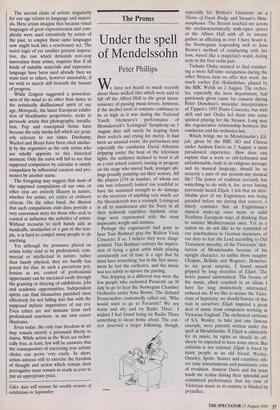The Proms
Under the spell of Mendelssohn
Peter Phillips
Whave not heard so much recently about those wicked tiles which were said to fall off the Albert Hall to the great incon- venience of passing music-lovers; however,. if the decibel level at concerts continues to be as high as it was during the National Youth Orchestra's performance of Shostakovich's 'Leningrad' Symphony on 3 August they will surely be leaping from their sockets and crying for mercy. It had been an unusual event, the performers and especially the conductor David Atherton dripping under the heat of the television lights, the audience inclined to treat it all as a vast school concert, waving at progeny on the stage who waved back, younger sib- lings proudly pointing out their seniors. All the players (154 in number, of whom not one was coloured) looked too youthful to have the sustained strength to do damage to the structure of anything very much, yet the Shostakovich was a triumph. Leningrad in all its massiveness and the Nazis in all their tediously repetitive rhythmic strut- tings were represented with the most impressive weight and stamina.
Perhaps the cognoscenti had gone to hear Yuri Bashmet play the Walton Viola Concerto; if so, I believe they were disap- pointed. That Bashmet conveys the impres- sion of being a great artist while playing consistently out of tune is a sign that he must have something; but in the first move- ment he lost the orchestra, and the music was too subtle to survive the parting.
Not dripping in a different way were the few people who eschewed Pavarotti on 30 July to go to hear the Norwegian Chamber Orchestra under Iona Brown. The diehard Promenaders contentedly called out, 'Who would want to go to Pavarotti? We are warm and dry and on Radio Three'. I wished I had found being on Radio Three something to shout home about. The con- cert deserved a larger following, though,
especially for Britten's Variations on a Theme of Frank Bridge and Strauss's Meta- molphosen. The Strauss reached me across the uncharacteristically wide-open spaces of the Albert Hall with all its intense pathos as affecting as ever I have heard it, the Norwegians responding well to Iona Brown's method of conducting with her bow, waved like a magician's wand, during rests in the first violin part.
Tadaaki Otaka seemed to find conduct- ing a more full-time occupation during the other Strauss item on offer that week: the much earlier EM Heldenleben, played by the BBC Welsh on 2 August. The orches- tra, especially the horn department, had previously given cause for concern during Peter Donohoe's muscular interpretation of Tippett's 1955 Piano Concerto, but with skill and tact Otaka led them into some spirited playing for the Strauss. Long may the regenerative relationship between this conductor and his orchestra last.
Which brings me to Mendelssohn's Eli- jah, given by the BBC SO and Chorus under Andrew Davis on 5 August, a most paradoxical experience. How does one explain that a work so old-fashioned and unfashionable, both in its religious message and its musical language, should be so securely a part of our present-day musical life? The power of tradition certainly has something to do with it, for, never having previously heard Elijah, I felt that an iden- tifiable part of my Englishness was being paraded before me during that concert, a timely reminder that an Englishman's musical make-up owes more to solid Northern European ways of thinking than to sunnier Mediterranean ones. Yet as a nation we do not like to be reminded of our indebtedness to German musicians, of our duty to fear the Lord according to Old Testament morality, of the Victorians' idol- isation of Mendelssohn because of his upright character, so unlike those naughty Chopins, Bellinis and Wagners. However, to my great surprise, I found myself gripped by long stretches of Elijah. The hours passed unremarked. The beauty of the music, albeit couched in an idiom I have for long instinctively mistrusted, seduced me. If we like to accuse the Victo- rians of hypocrisy, we should beware of this trait in ourselves: Elijah inspired a great deal of music from composers working in Victorian England. The orchestral anthems of S.S. Wesley, to take just one famous example, were patently written under the spell of Mendelssohn. If Elijah is admirable for its music, by rights so should its off- shoots be expected to have some merit. But criticism is not rational: Elijah is loved by many people as an old friend; Wesley, Ouseley, Spohr, Stainer and countless oth- ers raise instantaneous and passionate cries of revulsion. Andrew Davis and his team made me realise during their splendid and committed performance that my view of Victorian music in its entirety is blinded by prejudice.


















































 Previous page
Previous page